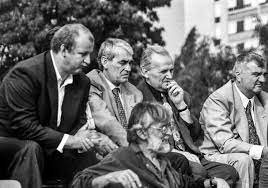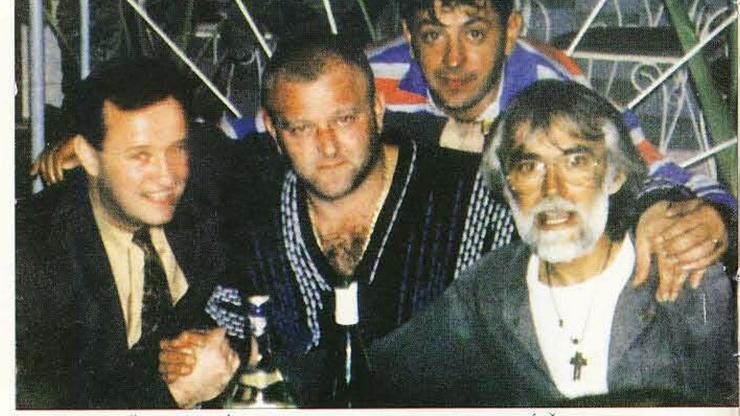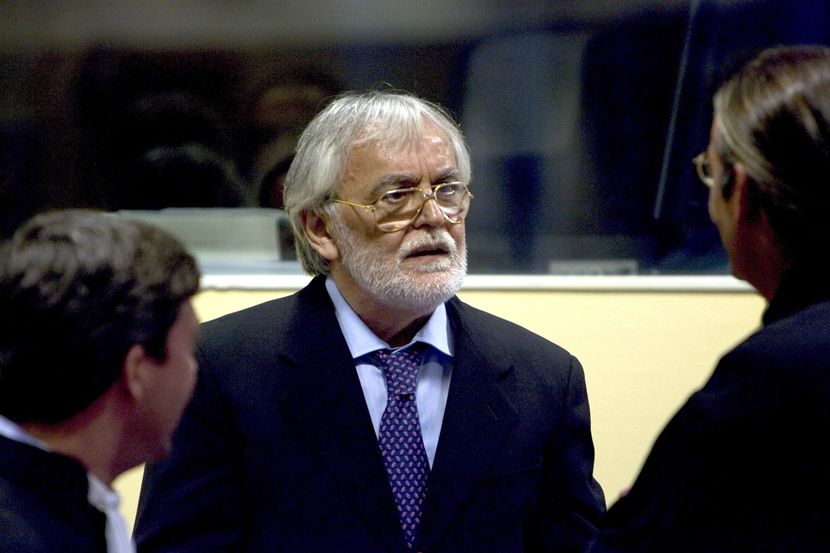Period:
Yugoslav Wars
Region:
Bosnia and Herzegovina
Croatian crminal in Herzegovina Mladen Naletilić (1946-2021)
Mladen Naletilić (1946) aka Tuta is a former Croatian emigrant and convicted war criminal from the early 1990s when he was the commander of a Croatian paramilitary unit, which left bloody traces in Herzegovina in the massacres of Serbs and the Muslim population.
In the mid-1960s, he emigrated from his homeland and went illegally to West Germany, where he joined the Croatian-Ustasha emigration, whose aim was to dismantle SFR Yugoslavia and restore the clerical-fascist NDH.
When the civil war in Croatia began in mid-1991, he returned by decree of Franjo Tudjman and joined the "fight for freedom and independence". He also became a member of the so-called National Guard Corps. He later went to Herzegovina and in mid-1992 established his Punishment Battalion unit of the Croatian Defence Council in Široki Brijeg, one of the most brutal in the Bosnian-Herzegovinian war.

He considered as traitors all those Croatian leaders in Croatia and Bosnia who accepted the military alliance with Muslims in Washington in 1994. They later turned their backs on him.
Following the end of the wars in Yugoslavia in the 1990s, Mladen Naletilić was sent to the Hague Tribunal where he was tried before the International Criminal Court for crimes against humanity and violations of the laws and customs of war but only against Muslims. The war crimes against Serbs were not included in the indictment.
After serving two-thirds of his sentence in an Italian prison, he returned by plane to Split. However, Naletilić was later sentenced in 2015 before the Zagreb County Court to 3.5 years in prison for the 1995 murder of Damir Brekal.
CURRICULUM VITAE
Mladen Naletilić aka Tuta was born on December 1, 1946, in Široki Brijeg in the western parts of Herzegovina, 20 km away from Mostar.
Today he lives in Zagreb with his sons.
Origin
His father's name was Mato, and his mother's name was Slavka. Apart from Mladen, they had five other children. They lived in the village of Cigansko brdo, and his father was a miller.

Throwing Serbs into a pit
His cousins, father, grandfather, and uncles were members of Croatian fascist units (home guards and Ustashas) during World War 2 and took part in the massacres of Serbs in Herzegovina when tens of thousands of Serbs were killed and far more exiled.
After the war, some of them emigrated to the countries of Western Europe, where they hid their dark past and involvement in the genocide.
Education
Mladen Naletilić completed elementary school in his hometown. He finished only two grades of high school. He enrolled at the Faculty of Law in Sarajevo by falsifying documents on the completion of the 3rd and 4th grades of high school. He did not go far in his studies, and the university administration never discovered the hoax about fake documents. He did not even manage to pass one exam.
During his studies, he had anti-state activities (spreading national hatred by handing out leaflets) among the youth and thus became the target of the secret police. This is when he made the decision to leave his homeland and go abroad.
Emigration
He decided in 1968 to flee to West Germany, where there were already many of his compatriots, but he was captured on the border with Austria and returned to his hometown to serve his regular military service. That is how he ended up in Niš to fulfill his civic duty toward the SFRY.
He legally obtained a passport in 1973 and went abroad. He became part of the militant organization United Croats of Germany. This was an extremely radical group with Nazi attitudes, ideas, and actions. One of their terrorist actions was planting a bomb on the Yugoslav consulate.
Insiders say that he lived briefly in an unmarried marriage with Brigitte Heinrich, a blonde who was a fan of leftist ideas. In those years, he was involved in arms smuggling on the Franco-German border.
Since the Yugoslav UDBA also had its agents there, young Naletilić agreed to cooperate with the German BND and the Bulgarian KDS secret service to protect himself.
He graduated from the school for managers, but he didn’t do that job but opened a chain of casinos in Germany, Belgium, and the Netherlands. He married a German woman with whom he had two sons. This enabled him to progress in the business with nightclubs. In the southern part of Germany, on Lake Constance, he had a large nightclub and an illegal brothel.
 Herzegovinian gang: Susak, Boban and Tuta Herzegovinian gang: Susak, Boban and Tuta
He made large financial contributions to the Roman Catholic Church, where he had more than good cooperation with friars and priests. By the end of the 1980s, he gained a substantial fortune estimated at ten million German marks.
CRIMINAL ODYSSEY
At the beginning of 1990, there was a change of government in FR Croatia. Franjo Tudjman and the Croatian Democratic Union party (HDZ) formed the government and launched anti-Serb activities, as well as the process of secession from the SFRY, the creation of paramilitary formations, etc.
Mladen Naletilić returned to his homeland in the middle of 1990, accompanied by Vice Vukojević, then a high-ranking HDZ member, who handed him his passport. Naletilić became a Croatian National Guard (ZNG) member and immediately joined the fight against the Serbs and the JNA (Yugoslav Army).

Naletilić founded the paramilitary formation "Punishment Battalion" in June 1991, receiving a personal blessing from Franjo Tudjman. When the war in Bosnia and Herzegovina began, the main headquarters of the unit was transferred to his hometown of Široki Brijeg. He was already accepting various humbugs and volunteers from abroad into his ranks: Argentines, Paraguayans, Germans, French, and English. All of them were on the Interpol list of suspects for various crimes.
This unit was part of the Second Guards Brigade of the so-called Croatian Defense Council, an armed formation of the Croatian parastate of Herceg-Bosna.

Mostar in the twenties
He crossed the Neretva Valley with his Battalion and took part in the ethnic cleansing of Serbs, boosting about it in public. He also took part in the criminal operation "Čagalj" when the wider region of Mostar was cleared of Serbs.
When he returned to his hometown, he enjoyed a great reputation because he was a donor for various events. He was not too interested in politics, so he was not a member of the HDZ. He publicly advocated for the borders of Croatia in 1939, although his appetites were far greater, that is, the territory of the Independent State of Croatia.
He formally withdrew from the Punishment Battalion at the end of 1992, when he was wounded, so Ivan Andabak took over the role of commander. It is also interesting that the fugitive Muslim general Yusuf Prazina joined his unit.
He was of the opinion that local commanders should be in command in Herzegovina, and not "Tito's UDBA" (Yugoslav State Intelligence Service) sent from Zagreb (Slobodan Praljak and others).
When the Croat-Muslim conflict broke out in BiH in the summer of 1993, he held positions around Mostar and fought against Muslim units. He considered the leadership of the Herceg Bosna, as well as those in Zagreb as traitors because of the signing of the Washington Agreement in 1994, which implied the alliance with Muslim leader Alija Izetbegović.
During the war, Naletilić was the master of death and life in Herzegovina. As such, he could blackmail and racketeer whoever he wanted. Insiders say that a butcher in Mostar had to pay him 2,000,000 DEM for the purchase of new military equipment.

1996's party
Controversies say that almost all prominent members of the HDZ party came to Naletilić’s place at Cigansko brdo to party and socialize.
TRIALS AND INDICTMENTS
When the International Criminal Tribunal for the former Yugoslavia in The Hague sought responsibility for Croatia's atrocities against Muslims, on February 24, 1997, the Croatian leadership arrested Mladen Naletilić in Dalmatia. This was done on the order of Miroslav Tudjman, director of the Croatian Intelligence Service, in the secret operation "Barracuda". He was held in the Remetinec prison for two years, and then secretly delivered to the Hague Tribunal on March 21, 2000.

Naletilic listening to the verdict in The Hague
The Hague Court found Naletilić guilty after a long trial (2001-2002) and sentenced him to 35 years in prison in the first-instance verdict on March 31, 2003, and to 22 years in prison in the second-instance verdict. He was convicted of persecuting Muslim civilians in the Mostar and Jablanica areas, setting up camps, forced labor, and deportations, as well as destruction and looting during 1993-1994.
War crimes against Serbs were not included in the indictment, because the Hague Tribunal stuck to a version according to which Serbs had no victims, but bear the main responsibility for the Yugoslav wars of the 1990s.
He was released on February 18, 2013, after serving two-thirds of his sentence. He returned to Split by plane from Rome. He was greeted at the airport by relatives and comrades-in-arms, as well as various "patriots".
However, the authorities in Zagreb continued to persecute him, so an indictment was filed against him in 2013. In the new indictment, Naletilić was charged with committing a kidnapping in Mostar on November 24, 1993, and with ordering the murder of Damir Brekal in Široki Brijeg on April 19, 1995, but he survived by sheer luck.
In November 2015, the Zagreb County Court sentenced him to 3.5 years in prison.
DEATH AND LEGACY
On 17 March 2021, the Balkan press spread the news that Mladen Naletilić died in Mostar (Herzegovina) after he had been brought to the hospital. He was said to die of a heart attack.
He was buried in Široki Brijeg two days later.
Tuta enjoys great respect among Croatian nationalists, and he is considered a national hero, especially among Croats from Herzegovina who claim that his Punishment Batallion dared to go to those conflict areas where nobody else didn't. He is also considered most responsible for cleansing Mostar of Serbs.
Tags:
Please, vote for this article:
Visited: 1028 point
Number of votes: 16
|